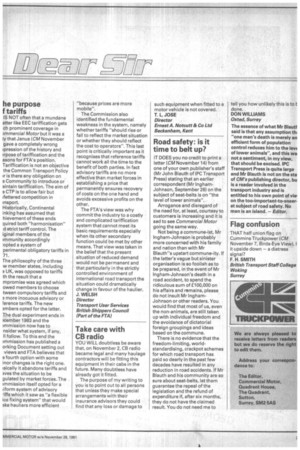he purpose f tariffs
Page 17

If you've noticed an error in this article please click here to report it so we can fix it.
IS NOT often that a mundane atter like EEC tariffication gets ch prominent coverage in )mmercial Motor but it was a ty that Janus (CM November gave a completely wrong ipression of the history and irpose of tariffication and the asons for FTA's position. Tariffication is not an objective the Common Transport Policy ir is there any obligation on Community to introduce or aintain tariffication. The aim of
e CTP is to allow fair but 'fettered competition in in sport.
Historically, Continental inking has assumed that hievement of these ends quired both "harmonisation" d strict tariff control. The iginal members of the immunity accordingly opted a system of perimental obligatory tariffs in 71.
The philosophy of the three w member states, including 3 UK, was opposed to tariffs th the result that a mpromise was agreed which owed members to choose tween compulsory tariffs and 3 more inocuous advisory or f ere nce tariffs. The new ambers opted for the latter.
The dual experiment ends in member 1983 and the )mmission now has to nsider what system, if any, II follow. To this end the )mmission has published a orking Document setting out views and FTA believes that fourth option with some inor changes is the right one. isically it abandons tariffs and Ives the situation to be gulated by market forces. The immission itself opted for a dorm system of advisory Ifs which it saw as "a flexible ice fixing system" that would ake hauliers more efficient "because prices are more mobile".
The Commission also identified the fundamental weakness in the system, namely whether tariffs "should rise or fall to reflect the market situation or whether they should reflect the cost to operators". This last point is critically important as it recognises that reference tariffs cannot work all the time to the benefit of both parties. In fact advisory tariffs are no more effective than market forces in establishing a price that permanently ensures recovery of costs on the one hand and avoids excessive profits on the other.
The FTA's view was why commit the industry to a costly and complicated tariffication system that cannot meet its basic requirements especially when its other secondary function could be met by other means. That view was taken in the belief that the present situation of reduced demand would not be permanent and that particularly in the strictly controlled environment of international road transport the situation could dramatically change in favour of the haulier. J. WELSH Director Transport User Services British Shippers Council (Part of the PTA)








































